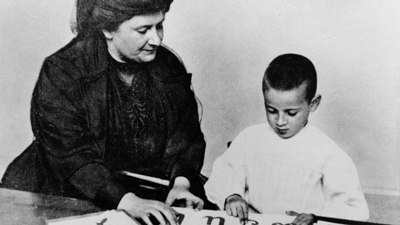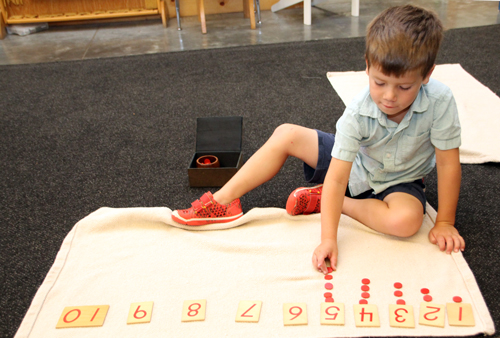 We know Dr. Montessori was a scientist, she observed children and made groundbreaking observations about the way they learn. Perhaps, more admirable is the way she connected childhood to being human. She made it possible for adults to see children as extensions of themselves, working towards the same goals and deserving of the same treatment.
We know Dr. Montessori was a scientist, she observed children and made groundbreaking observations about the way they learn. Perhaps, more admirable is the way she connected childhood to being human. She made it possible for adults to see children as extensions of themselves, working towards the same goals and deserving of the same treatment.
It is easy for us to see children through an immediate lens, as little people trying to meet their basic needs. They search for food, clothing, shelter, defense, and ways to move. They also long for love and other spiritual needs. If we zoom out, the child’s tasks are much bigger. In the first six years of life, the child has two key duties: to construct themselves and to adapt to their environment. What is driving the child to do this? Dr. Montessori saw and wrote about the human tendencies, defined as urges or natural inclinations that drive humans to meet their needs.
The fourteen human tendencies are hereditary, unchanging, and interrelated. They are universal to all humans regardless of time and culture, but are significantly powerful during the first six years of life. If we want to understand what guides our children to become who they are, we need to recognize and understand the fourteen human tendencies. I will outline them below and invite you to reflect on how they might inform the way you support your child.
Exploration: The more we explore, the deeper we understand the world and the more we can improve the human condition. The adult can support this tendency for the child by ensuring freedom of movement, freedom of choice, and a beautiful and orderly environment.
Orientation: To be comfortable, humans need to place themselves in relation to their environment. This is the inclination to find a point of reference. Young children are very new to their environment and need a predictable, safe and reliable space with minimal stimulation.
Order: Physical order brings mental order. Order gives a young child comfort and freedom, which are essential for engagement and learning.
Communication: Communication allows humans to correspond about satisfying their needs, transfer knowledge, and share stories. The adult can provide a clear model of language. Freedom to communicate in the environment is also essential.
To Know/To Reason: The tendency to know and to reason is especially prevalent in the elementary mind. The adult should inspire children to reason for themselves by providing resources for children to find their own answers.
 Abstraction: Abstractions are concepts that are not tangible in the child’s reality. Maria Montessori made abstract concepts, like quantity, color, and subtraction, concrete by creating materials that the child could manipulate with their hands.
Abstraction: Abstractions are concepts that are not tangible in the child’s reality. Maria Montessori made abstract concepts, like quantity, color, and subtraction, concrete by creating materials that the child could manipulate with their hands.
Imagination: The Montessori environment provides the child with a strong basis of the concrete world as a springboard for imagination. The adult must allow for the child’s own creativity by providing quality tools and letting children choose how to use them.
Mathematical Mind: We use mathematical thinking to measure the amount of flour in a recipe or the length of a table that is to fit through a doorway. To nurture this human tendency in the child, the adult must provide presentations in sequential order so concepts build off of previous understandings.
Work: Work is needed for survival, satisfaction, happiness, capacity, spirit, and turning ideas into reality. The adult must know how to choose inspiring, authentic, purposeful, and constructive work that will satisfy the child, rather than busy work that might satisfy the adult agenda.
Repetition and Exactness: Repetition and exactness are key characteristics of work that are very apparent in children. The adult must provide freedom to repeat activities that require exact movements.
Activity and Manipulation: Activity unites the mind and the body. Children need opportunities for movement and motives for movement, including activity of the hands.
Self-Perfection: Humans have a natural tendency to persevere and an inner compulsion to be self-disciplined. In order to support the child’s search for excellence, we must provide appropriate freedom and allow children to self-correct.